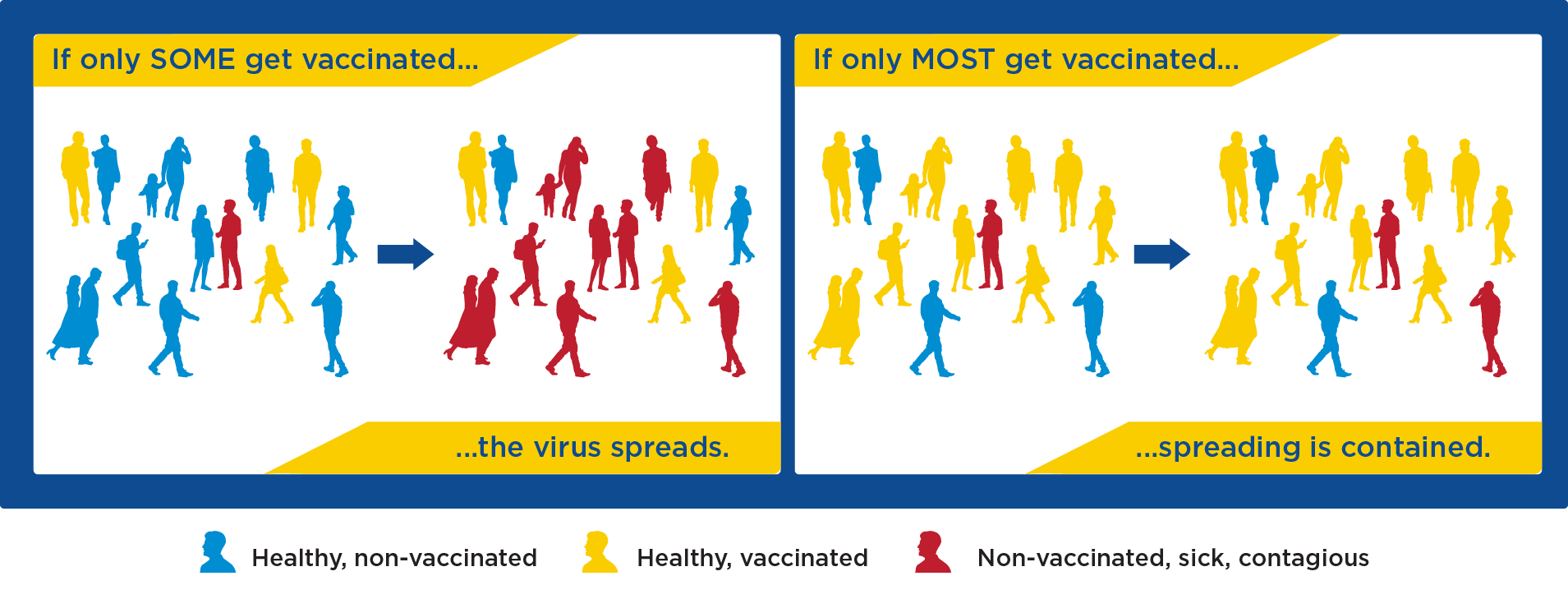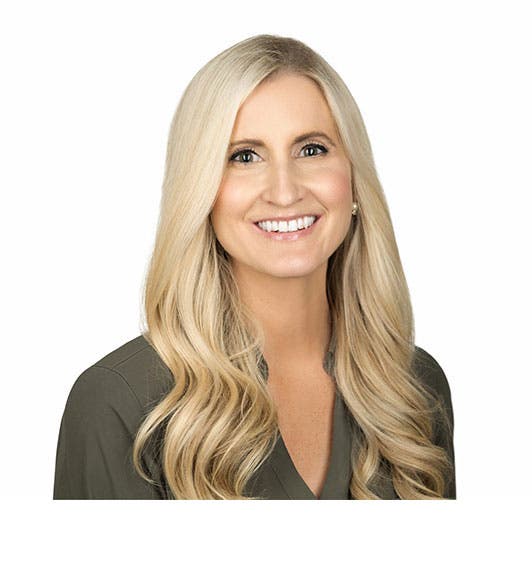Herd Immunity: When it Comes to COVID-19, We Are All in This Together
What do smallpox, polio, and measles1 all have in common? They have all been successfully eliminated in the U.S. via wide-spread vaccination. After ten long months, the COVID-19 vaccine roll-out is finally happening and we are well on our way to successfully combating another infectious disease.
What will determine if the new vaccines are successful?
Simply put, people need to get vaccinated for a vaccine to be effective. Yes, the vaccine itself must be safe and have high efficacy (i.e., create an adequate immune response in those vaccinated), but ultimately what determines if a vaccine is truly successful at eliminating a disease in a population comes down to herd immunity.
What is herd immunity?
Herd immunity is the act of protection that is provided when enough of a population gains immunity to an illness that it halts transmission. Every infectious disease has a reproduction number or R0 (pronounced “R naught”). This calculation is the average number of people an infected individual will infect in an at-risk (non-immune) population. Inevitably, for any given disease, the R0 calculations can vary widely, but are generally based on three primary characteristics:
- How long an individual is contagious while infected
- The likelihood of infection per contact between an infectious person and a susceptible person
- How often people are encountering one another (contact rate)
With COVID-19, R0 estimates change based on location and population, but some studies calculate it being as high as 5.7 (95% CI 3.8–8.9) .2 So, if I am infected with COVID-19 and interacting with a completely vulnerable group of individuals, on average, I could expect to infect five other people. To reach herd immunity, you essentially need to pass an immunity threshold that makes it so that an infected person has no one to transmit the infectious disease to because no one around them is susceptible (R0 < 1).3

Why do we need to get vaccinated?
Herd immunity has been a hot topic throughout the pandemic as there are only two ways to truly achieve it: 1) natural immunity via infection and 2) immunity via vaccination. Unfortunately, when it comes to most infectious diseases, natural immunity through active infection might not be enough to offer full protection and any immunity provided could dissipate over time leaving some individuals vulnerable to reinfection. Additionally, waiting for a population to become infected, and therefore immune, can take a very long time and may result in unnecessary deaths and long-term health implications.
One great example of this is chickenpox. Not long ago, parents would purposely expose their children to infectious individuals to ensure immunity was developed at a young age. I can remember vividly being forced on a play date while covered in spots. Unfortunately, to achieve this natural herd immunity, each year, over 10,000 were hospitalized and an estimated 100-150 died. After the vaccine became widely available in the U.S. in 1995, more than 3.5 million cases of chickenpox are now prevented each year.4
How many people need to get vaccinated to achieve herd immunity?
The estimated number of people that need to get vaccinated to achieve herd immunity depends on several factors:
- The infectious disease and how contagious it is.
- The proportion of people that are susceptible in a population.
- The overall effectiveness of the vaccine.
Experts do not yet know what that threshold is for COVID-19. This is because we do not know how many of us already have immunity. Dr. Anthony Fauci, Director of the National Institute of Allergy and Infectious Diseases, estimates that around 75% of the public needs to get vaccinated for herd immunity to provide protection and truly stop the spread of COVID-19.5
How do we learn more about the COVID-19 vaccines and the plan to reach herd immunity?
Concerns over the speed with which these vaccines were developed are warranted. We should all do our due diligence with any new public health intervention. Thankfully, the information on safety is widely available. Here are three comprehensive resources to help address any concerns you, your family, or your staff may have:
- CDC COVID-19 Vaccine Update Resource including all safety information
- Coronavirus Vaccine Tracker including the latest updates and information on all COVID-19 vaccines (safety and efficacy)
- How CDC Is Making COVID-19 Vaccine Recommendations
What can we do now?
The Centers for Disease Control and Prevention (CDC), in consultation with the U.S. Advisory Committee on Immunization Practices (ACIP), is prioritizing vaccine distribution in a fair and ethical way and continuing to provide transparent updates on the vaccine roll-out plan. While we wait for our turn to be vaccinated, we need to remind our family, friends, and staff to continue to do all the things that we have been doing – wear masks, maintain social distance, avoid indoor and poorly ventilated spaces, wash our hands, and clean and disinfect regularly. We do these things to protect ourselves, but more importantly, to protect others. That is also true of vaccines. We get them to create herd immunity and protect those in our society that are most vulnerable. I, for one, am looking forward to adding another eliminated disease to the above vaccine success list – smallpox, polio, measles, and COVID-19!
For the latest information on COVID-19 and variants, visit our CloroxPro COVID-19 Hub.
References
- Measles Elimination [Internet]. Centers for Disease Control and Prevention (CDC). 2020. [cited 2020 Dec 8] Available from: https://www.cdc.gov/measles/elimination.html
- Sanche S, Lin YT, Xu C, Romero-Severson E, Hengartner N, Ke R. High Contagiousness and Rapid Spread of Severe Acute Respiratory Syndrome Coronavirus 2. Emerg Infect Dis [Internet]. 2020. [cited 2020 Dec 8] Available from: https://wwwnc.cdc.gov/eid/article/26/7/20-0282_article
- Delamater PL, Street EJ, Leslie TF, Yang YT, Jacobsen KH. Complexity of the basic reproduction number (R0). Emerg Infect Dis [Internet]. 2019. [cited 2020 Dec 8] Available from: https://wwwnc.cdc.gov/eid/article/25/1/17-1901_article
- Chickenpox (Varicella) [Internet]. Centers for Disease Control and Prevention (CDC). 2020. [cited 2020 Dec 8] Available from: https://www.cdc.gov/chickenpox/about/index.html
- Armour, S. Fauci Calls Coronavirus Vaccine a Game Changer, Decries Misinformation [Internet]. The Wall Street Journal. 2020 Dec 8. [cited 2020 Dec 8] Available from: https://www.wsj.com/articles/deborah-birx-and-anthony-fauci-to-discuss-coronavirus-response-11607432098


